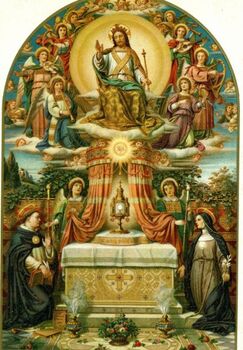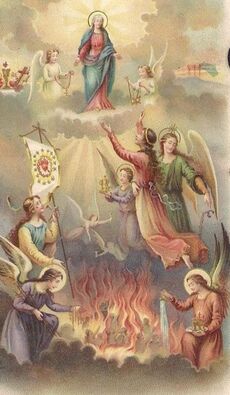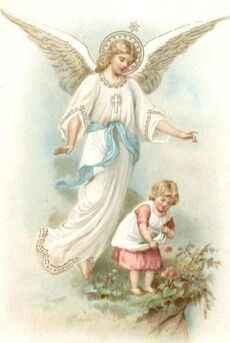
"In this present time let your abundance supply their want, that their abundance also may supply your want, that there may be an equality."— -2 COR. 8, 14.
One of the most glorious articles of our faith is the Communion of Saints. The Catholic Christians remain truly united among themselves whether they are in heaven, on earth or in purgatory. This communion is not a communion of bodies but of souls, which confines their love, their desires and their compassion for their brethren to no place, and therefore they mutually remember each other throughout all space and time and continue their love and compassion towards each other forever. Every day Catholic Christians depart from this life, but yet in such a way that they are not completely and forever separated from us, in so far as they go into eternity in the grace of God. And as our Divine Saviour is the head of all Christians in heaven, on earth and in purgatory, so the Catholic Church always remains by the Communion of Saints in heaven as triumphant, in purgatory as suffering, and on earth as the militant Church. The more the blessed in heaven are united with Jesus, the greater is their love towards us, their brethren on earth, in order that we may share in the same happiness. The more the poor souls in purgatory suffer, the stronger is their desire for bliss, and the greater their wish that we Christians on earth may lessen their pains through our prayers and zealously make use of the means of grace of holy Church for ourselves and for them. And if the poor souls are unable to help themselves by prayer to God, they the more zealously pray God for us, the more we help them.
Yes, marvelous is this Communion of Saints. The saints in heaven who behold God are holy; we all, my friends, have been sanctified in Baptism and should become still holier by the Sacraments; and the poor souls are holy, for although they still suffer and do penance, they are nevertheless on the way to their bliss. Hence St. Paul says so beautifully and truly speaking of the Communion of Saints, that the abundance of the saints in heaven supply our want that there may be an equality. And they do it, since the abundance of their merits and sufferings on earth and intercession in heaven come to our aid, while we again on earth effectively help the poor souls and can apply the abundance of our means of grace to them. This takes place especially by indulgences. Therefore I shall speak today on the intercession of the saints and show how their abundance of merits are applied to us through indulgences.
O Jesus, assist me with Thy grace.
I. The Apostle St. Paul imposed on a public sinner of the Christian congregation at Corinth which he the Apostle -- by his indefatigable zeal and preaching the Gospel had established, a severe and public penance. He dismissed him from the communion of the faithful " with the power of our Lord Jesus Christ," and excluded him from participation in divine service, in the holy sacrifice and the holy sacraments, "in order that he might be saved in the day of our Lord Jesus Christ," as the holy Apostle expresses himself in his epistle to the faithful at Corinth. After the example of this great Apostle, and by virtue of the power confided to her by the Saviour, Holy Church has also imposed similar and long penances upon public sinners. And after the example of that sinful Christian of Corinth, and other Christians who had the misfortune to fall into public and grievous sins, have with the same willingness, yes, mostly of their free will, submitted to such penances in order that they also " would be saved in the day of our Lord Jesus Christ." St. Paul later remitted to this sinner the remainder of the penance and that, too, as he himself writes in his second epistle to the Corinthians : " For what I have pardoned I have done it for your sakes in the person of Christ." (2 Cor. 2, 10.) The holy Apostle therefore grants to this sinner an indulgence. But from his own words we learn two important truths in reference to indulgences: the first is that St. Paul, and consequently the other Apostles and in general the Church, has the power to grant indulgences in the person of Christ. Secondly, St. Paul made use of this power on account of the intercession, the prayers and merits of the faithful at Corinth, " for your sakes." Indulgences show forth in the most resplendent manner the Communion of Saints and intercession for fallen Christians. For, where one member of the body of Christ, namely of the Holy Church, rejoices, there rejoice also the other members, the other holy Christians ; but where one member suffers, there suffer also the other members with him. His misery of soul, his unhappiness to have fallen so low goes to their hearts. Therefore they offer for his welfare their prayers, the holy sacrifice, the reception of the sacra ments and their merits. And just as God for the sake of the faithful grants to many sinners the grace of conversion so also the Church for their sake grants to the contrite, but still penitential sinners, pardon of their penance, that is an indulgence. Just as Jesus Christ in the hour of His death besought God to have mercy on us poor sinners, and in order to be heard, applied his merits to us, so those holy Christians at Corinth turned their compassionate eyes towards their fallen brother and besought the Apostle to pardon him.
This constantly takes place in the Church of God. The holy Martyrs who fearlessly professed the Christian faith before the courts of the heathens, amidst the greatest pains on the rack and were thrown into prison, joyfully beheld a bloody death — the Martyrs, who on account of their courageous profession, still living in prison, the objects of the joy of the Church, were the admiration and honor of the faithful, these holy Martyrs thought constantly of the suffering of their fallen brethren and made intercession for them. If in spite of their wounds they were still able to write, they wrote the names of the penitents whom they made intercession for, which are called libella or the books of the martyrs; if they could not write they simply gave the names of their proteges to the deacons, who visited the martyrs in prison, administered to them holy communion, bound up their wounds or brought them food, which privilege they bought from the heathen jailers. The deacons brought these written or verbal recommendations to the Bishop, and the Bishop, for the sake of the martyrs, shortened the penitent's time of penance. He granted therefore after the example of the Apostles an indulgence. The glorious doctrine of the Communion of Saints, and consequently of the faithful on earth consists especially in this that the merits and good works and prayers are of benefit to one another. Therefore we behold how whole congregations interceded for those who had fallen on account of the fear of martyrdom, or who had denied the faith, if they saw that they were really contrite. We see how saints in prison and on the rack, by the glory and the constancy of their faith, in the greatest sufferings encouraged the faithful and caused public sinners to return to the faith and like the dying Saviour in compassionate love besought the Church to forgive them.
How should in that solemn moment, when by the last struggle of the martyrs our Divine Saviour was glorified before the world, the Church seals with a new glory her truths, when the martyrs are crowned with an eternal crown and the faithful celebrate with joy the victory of their brethren — how should in that solemn moment any member of our holy Church re main excluded from the common joy and continue in sadness? The very sight of the courageous confessors and martyrs was pain enough for the penitents that they had fallen so deeply by their sins. Therefore they should participate in this common joy, and for the sake of the martyrs and their intercession they were received again into the communion of the faithful and therefore granted an indulgence of the rest of their penance. Here the words of the Apostle are applicable: "That their abundance supply your wants that there may be an equality." An indulgence is consequently the forgiveness of ecclesiastical penance on account of the intercession and the merits of the saints and especially of Christ, and God pardons just as much of the temporal punishments in purgatory as we would have atoned for if we had really performed this penance. In indulgences we learn, my beloved, at the same time what a glorious consciousness once penetrated the Christians, how intimately they were united to the Christian community and were of one heart and one soul, Here we see that Christian morality and purity was the common spirit, the disapproval of vice and disobedience towards God and the Church was general, sorrow for sin was a common grief, love and intercession for the penitents in public prayer during divine service and the holy sacrifice of the Mass was performed by the common bond of charity. Yes, indulgence which the ignorant and unbelieving, puffed up with a miserable pride, despise and with vulgar stupidity ridicule — indulgence is one of the most beautiful and consoling doctrines of the Catholic Church.
3. Is intercession made no more for the sinner and the fallen? Most certainly, but in a different way. We have in the present day no martyrs and no public penances; ecclesiastical penances are supplemented by indulgences. Therefore, indulgence teaches us again that neither God nor Holy Church has joy in punishment, and that punishment is not inflicted in order to injure, but in order to make satisfaction to the divine Justice, in order — as the Apostle says — that the soul may be saved in the day of the Lord. If therefore this satisfaction to the divine Justice can be made in an other and a milder way, then the temporal punishment is all taken away. This is done by indulgences. The Church, my beloved, wishes to lead us to God by indulgences for our justification as she formerly did by penance. She relies on the free and willing zeal of the faithful and admonishes them to works of charity. She announces to them who wish to sanctify them selves and fulfill the conditions of indulgences, forgiveness of ecclesiastical penance on earth and temporal punishment in purgatory. By sincere zeal to gain indulgences reverence for the justice of God, which punishes the least sin, is always manifested. Who therefore does not strive with his voluntary penance to obtain indulgences exposes himself on the day of the Lord and will more deeply feel the penance of purgatory, the less he strove to make satisfaction to divine justice on earth.
Those Christians who are not satisfied with only contritely confessing their sins, but strive earnestly to do penance for them and as often as possible to obtain indulgences for them, obtain the intercession and the merits of the martyrs and confessors, the intercession and merits of the whole Church and of all holy people, the same as the penitents did in the first ages of the Church. Moreover, they share in the public prayers for sinners and penitents, the holy sacrifice, the good works, the suffering and persecution of the just. The catechism teaches us that the prayers, the merits and the good works of all the faithful are of benefit to all. This continually takes place on earth and will until the end of the world, but especially by indulgences.
The Saints will also make intercession for us. They give to us, when we strive to attain an indulgence, the abundance of their satisfying merits in order that there may be an equality. But the Saints grant to us not only their superfluous merits in indulgences as a charitable rich man would give of his surplus fortune in alms to the poor, but they intercede also for us at the throne of mercy. Once the holy martyrs and the faithful in the early Church called upon the Church for compassion and mercy to the fallen and the penitent, in order that they would, after the forgiveness of their penance, the sooner be received into the communion of the faithful and allowed to attend divine service and share in all the rights of the worthy Christian. At present we see in spirit the same confessors, martyrs and all the saints imploring for us the divine mercy at the throne of God in order that with the help of indulgences and the merits of the saints we may the sooner be permitted to share with them the celebration of the eternal Sunday and to join in the hymn of praise of the heavenly hosts around the throne of the immaculate Lamb. The holy longing of the Blessed is that we may not be for long years excluded from the doors of heaven and obliged to go the hard way of penance and pain in the fires of purgatory.
4. Oh, that you would all learn to understand rightly the glorious doctrine of indulgence and earnestly and zealously strive whenever possible to gain an indulgence! Then the saints in heaven would look down upon you with greater love when they would see that their penance on earth, their suffering and abundant merits are applied by the Church to you by indulgence. Yes, this application is the reason that the saints in heaven love you with a twofold and a threefold love, and always continue to be your protectors in the hard struggle for life on earth against the devil and sin, and your zealous intercessors at the throne of God until you have happily, with their help, escaped the deluge of sin on earth and have arrived at the portals of heavenly bliss. How consoling and mysterious, my beloved, appears indulgence to us in the glory of its truth, and if considered in that love, which, as an out pouring of the divine love of our Saviour, also penetrated the saints. Oh, if you could behold the hearts of those great saints who were inflamed with divine love, who passed their holy angelic pure lives in continuous self-denial, penance and suffering, and freely, just as our Divine Saviour, offered themselves to the divine Justice for the sins of their Christian brethren, so that they gained not only for themselves celestial glory but atoned for the punishments of others. Yes, at this sight you would be seized with the desire to strive to become good children of our holy Mother, the Church, and to make use of her treasure of grace by gaining indulgences. You would even be inflamed with the fire of Christian charity to come to the help of your suffering brethren in Christ as much as possible by prayers and good works, in order to do for them what the saints in heaven have done for you.
5. There remains, my beloved, another glorious truth, a rich source of consolation in suffering in regard to indulgences which I will communicate to you. From what you have already heard, have you not experienced the amiable beauty of this doctrine? Yes, truly, enlightened by this article of faith we learn first to appreciate the innocence and the suffering, the prayers and the penances of the just Christians in their entire supernatural greatness. They are precious in the sight of God, so that they have obtained not only for the saints an eternal bliss but also have atoned for the temporal punishment of their neighbors. What a consolation for all who suffer innocently! What a joy for holy Christians who experience sufferings, trials and tribulations! Who will still accuse God of in justice, who will continue to blaspheme Him?
You sinners, when you contemptuously speak of the divine Justice and say: "I sinned yesterday, and what happened to me? I will sin today, and nothing will happen to me." You sinners, who trample on the commandments of God and of the Church and go still unpunished and even joyfully and blessed with temporal prosperity continue to live — whom have you to thank for this? Indulgences, the good works, the prayers and sufferings of holy Christians. You purse-proud people, you frivolous Christians, who so often laugh and scoff at the piety of your servants ; whom you often torment on account of their faith and devotion — whom have you often to thank if the judgment of God has not overtaken you, whom else but the piety and suffering innocence of Christian souls? They pray for you. You parents, who at the sick-bed of your little innocent children accuse God of cruelty — indulgence places for you the sick-bed of your child as an altar of atonement, the suffering innocence as a sacrifice of atonement for your sakes and for your sins. This sacrifice not infrequently turns aside the punishment from the guilty head of the parents and obtains for them mercy and grace.
May you all therefore be filled with reverence for this article of faith of the Catholic Church, which has a beauty and a truth which the miserable scoffers never dreamed of. May you strive by gaining indulgences to share in the merits of the saints in order that divine Justice may be appeased and that you may be spared in time and eternity. Amen.
Source: The Beauty and Truth of the Catholic Church, Vol. III Imprimatur 1913




 RSS Feed
RSS Feed